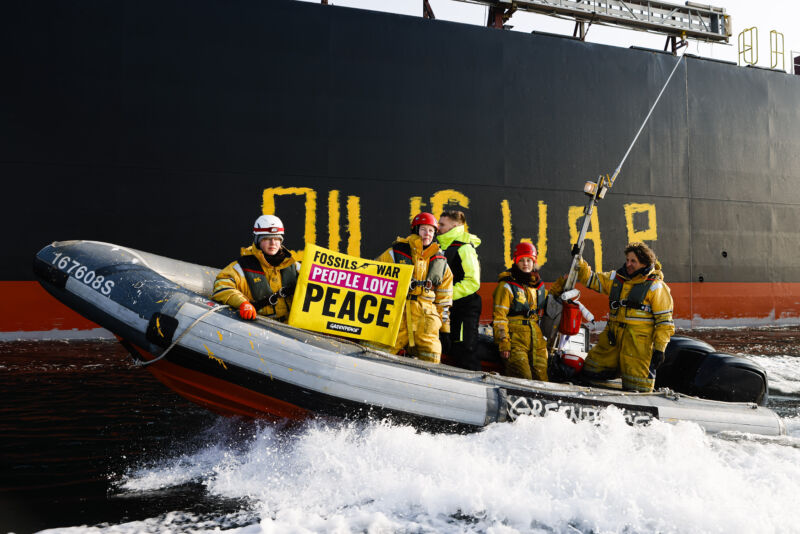Russian oil isn't unlawful yet, however a Twitter bot is getting an early advantage.

First there was the Russian oligarch stream tracker; then, at that point, there was the Russian oligarch yacht tracker; presently there's the Russian oil big hauler tracker.
The new instrument comes from information researchers at Greenpeace UK, who made a computerized bot that attracts from public information to tweet about the developments of oil and gas big haulers leaving Russian ports.
According to the objective, Greenpeace, is to remove one of Russia's fundamental income sources that is assisting fuel President Vladimir Putin's with fighting in Ukraine.
Russia draws significant income from oil and gas — around 40% of its government financial plan depends on non-renewable energy source sovereignties — and that implies that big haulers satisfying agreements are basically adding to Russia's conflict machine.
By tweeting the beginning, personality, and objective of big haulers that have docked at Russian ports, Greenpeace is expecting to disgrace organizations and nations into disregarding oil and gas buys from the country.
"That is a truly significant false reverence to feature strategically," Georgia Whitaker, an oil campaigner at Greenpeace UK, told Protocol.
"Government officials are expressing whatever might be considered appropriate, however they're not really setting that in motion."
Greenpeace guarantees that activists have proactively redirected a big hauler that was set out toward Sweden.
Taking everything into account, none of the shipments is unlawful yet.
The Twitter bot delicate sent off on March 11, only days after President Joe Biden declared a leader request prohibiting imports of Russian oil and gas and that very day Australia reported it would do likewise.
With the leader request, the Biden organization restricted new agreements taking effect right now and provided existing requests 45 days to finish conveyance.
The UK government said it will likewise transition away from the acquisition of Russian non-renewable energy sources, however it's giving purchasers for the rest of the year to twist things down.
No EU nations have established prohibitions on Russian oil or gas.
Utilizing public information
In any case, the bot gives extraordinary straightforwardness to an industry that will in general work out of general visibility.
The @RUTankerTracker bot utilizes information from MarineTraffic, what might be compared to a flight-following site.
The site utilizes the computerized distinguishing proof framework (AIS) that generally enormous boats (more noteworthy than 300 tons) or traveler ships are expected to utilize.
AIS is expected as a navigational guide to enhance radar.
Ships broadcast their GPS-decided areas on VHF frequencies. Different vessels inside around a 23-mile range can get the signs and plot them comparative with themselves and different boats nearby.
AIS can likewise communicate other sensor information, including pace of turn, pitch and roll, etc.
Greenpeace information researchers additionally utilize monetary information sources like Bloomberg and Refinitiv to help suss out a vessel's freight and objective.
By drawing on all that information, the tracker can figure out which boats have moored at Russian ports, declare updates to their courses, and uncover where they're going in light of their announced objective.
In any case, even with all that information, the tracker accompanies a disclaimer: following oil big haulers is more enthusiastically than following planes.
Some of the time those courses change, however, for an assortment of reasons — boats might change objections relying upon the cost of oil or gas, or they might have left port without an objective in any case.
"We accomplished this work as a quick response to the assault upon Ukraine,"
Greenpeace said in a stuck tweet. "[O]ur bot is more than a little flawed nor are we, however essentially we didn't wrongfully attack another person's country."
Running dull
The big hauler bot faces another test, however, one that state run administrations implementing authorizations will likewise battle to overcome.
Windward, an Israeli oceanic gamble consultancy, expresses that somewhere around 33 Russian big haulers switched off their AIS transponders last week, double the normal rate over the course of the last year, as indicated by a Bloomberg report.
Most "dull" activities happened close to Russian shores.
Now and again, Windward followed ships as they dillydallied close to different big haulers for a couple of hours, possibly moving oil from one to the next.
This conduct isn't new. A couple of years prior, Russian boats were discovered switching off their transponders to convey oil to Syria, the US Treasury Department said: "
[V]essels conveying petrol to Syria have been known to incapacitate their AIS transponders to cover their developments."
Worldwide oceanic regulation requires big haulers and other business vessels to keep their transponders on while adrift, and keeping in mind that that may not forestall commanders or proprietors expectation on overstepping the law, it helps restricted the quest for ships taking an interest in unlawful exercises.








0 Comments
Write a comment if you liked the topic